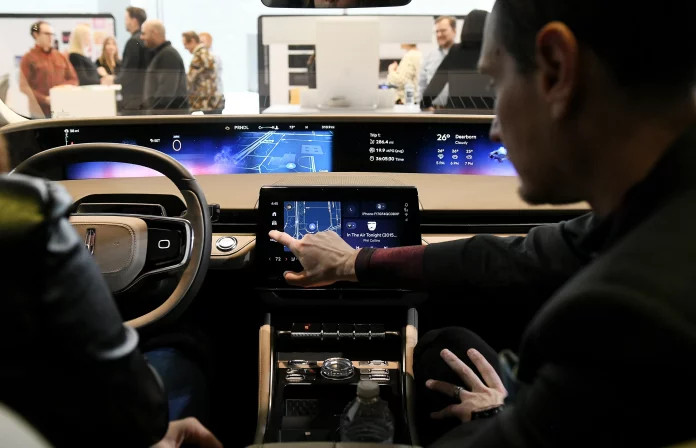On January 22, Ford shared details about the Ford and Lincoln Digital Experience, a new software suite available on the recently launched Nautilus, which will soon be added to other vehicles. The automaker developed this in-house operating system following a phenomenon in the auto industry. The high-speed and highly customizable software also offers in-car apps like YouTube and Amazon Prime Video. It also significantly improves integration with Apple CarPlay and Android Auto.
The Detroit automaker demonstrated both iterations of this system: one explicitly designed for Lincoln cars currently available on the Nautilus and another coming soon for Ford vehicles.
The windshield-wide dashboard screen lacks touch-sensitive controls, but is operated through a separate central display. This is Ford’s own interpretation of the “all screens, all the time” philosophy used to design the Cadillac Celestiq interior, Mercedes-Benz EQ Hyperscreen, and other vehicle infotainment systems.
Executives from Ford stated that processing speed is also a major priority. The automaker aims to enhance its technology game, recognizing that customers grow tired of the rather sluggish infotainment systems in many cars. This is often because automakers rely on outdated but dependable chipsets and lag behind the IT sector. The automaker claims that this new system provides eight times the storage capacity and processes graphics 14 times faster than the SYNC configuration.
Similarly, over-the-air updates—a technology first introduced by Tesla and now regarded as essential to the auto industry’s tech-driven future—are bringing additional features and upgrades.
Additionally, Ford is offering downloadable apps from Google Play like Spotify, Amazon Music, and Audible, just like a large portion of the industry, including direct rivals like General Motors’ Ultium EV platform.
Infotainment options include playing video games and streaming content on the vehicle’s displays, such as the Ford-only edition of the racing game Asphalt Nitro 2, which is playable with a Bluetooth game controller. YouTube, Prime Video, and the Vivaldi browser can all be used for streaming, and Google Chrome—which supports Bluetooth keyboards—will be available soon.
Ford emphasized that this software is just “the beginning” and that the future of winning could depend more on electric range and tech features than mechanical ones.





